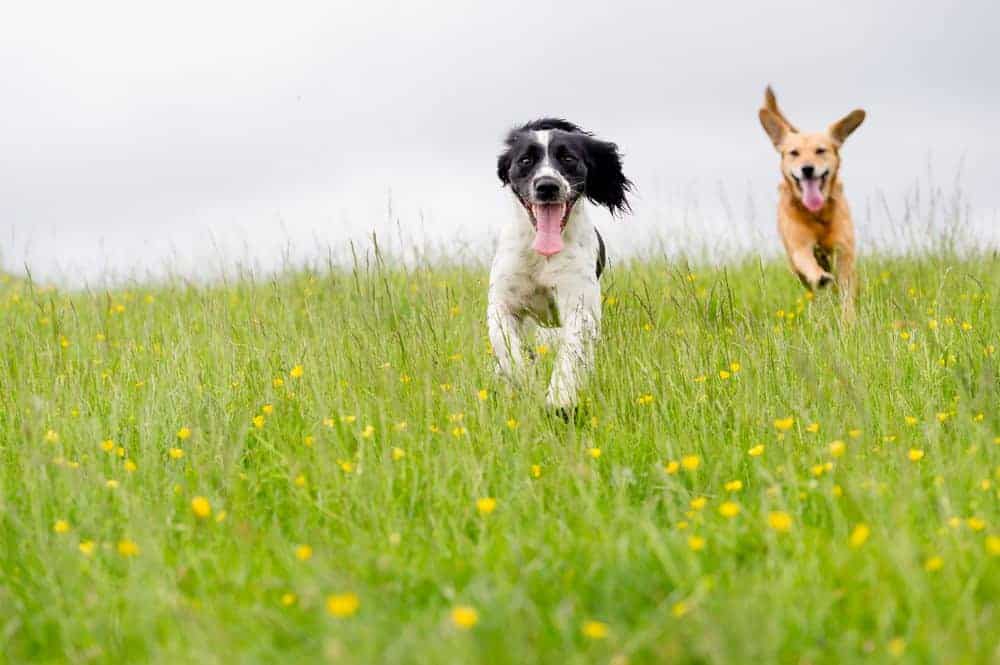
If your canine chum likes grazing on grass from time to time, it’s nothing to worry about. It’s actually a common behaviour in many dogs. And, while there are all sorts of theories as to why they do it – from fulfilling their natural omnivore instinct to improving digestion or simply because they enjoy the interesting taste and texture – no one’s exactly sure why.
Pet charity Blue Cross advises: “Many dog owners worry that their pet eats grass to make themselves sick to get rid of something they’ve eaten, or because they’re feeling under the weather. Others think that eating grass is a sign that their dog is lacking in some nutrients. But studies have shown that none of these longstanding beliefs can be proven. In fact, it’s far more likely that dogs eat grass because it tastes nice, particularly in the spring and summer months when it’s green and fresh. There shouldn’t be any need to worry about this if the habit doesn’t become excessive.”
Why do dogs eat grass? That is the question...
Canine expert Professor Stanley Coren – author of bestselling books including The Intelligence of Dogs, How Dogs Think and The Modern Dog – has investigated the issue of dogs eating grass in depth and advises: “Almost every week or two one of my clients asks me 'Why do dogs eat grass? If you Google the question, ‘Why do dogs eat grass?’ you will find 2,520,000 websites that purportedly deal with the issue. I glanced at about two dozen of these and every one of them mentioned eating grass to deal with an upset stomach and to cause vomiting. I have personally never found this explanation to be particularly satisfying because the cause and effect issues are all tangled up in it. Many dogs eat grass and don't end up vomiting (like my Beagle, Darby, who loved to munch grass as if it were a free salad and never once regurgitated from it afterward).”
However, there are instances when grass munching can be a bad thing:
- If the grass has been sprayed with harmful pesticides, for example, on verges by the side of the road
- If the grass is a source of lungworm
Dogs get lungworm by eating larvae found in infected snails, slugs or frogs. They can also accidentally eat infected tiny slugs, which may be inhabiting patches of grass. The lungworm larvae then grow inside the dog and adult lungworms move through their body to their heart and blood vessels. This can cause heart problems, breathing problems and pneumonia. After about 28 days the worms start to produce their own larvae which can lead to serious problems such as haemorrhages in the lungs, liver, intestine, eyes and spinal cord. If left untreated, it can be fatal in severe cases.
Talk to your vet about regular lungworm prevention treatment – standard flea and worm treatments sold in pet shops do not normally protect against lungworm and, if you spot slugs and snails in your garden or local parks, be extra vigilant. Always consult your vet as soon as possible if your dog becomes unwell.
DID YOU KNOW?
Grass seeds can be dangerous to dogs. At the end of summer/early autumn, seeds attached to the tops of long grass stems can easily brush off onto your dog as they stroll by. They can then get into ears, eyes and paws and work their way under the skin. Signs to look out for include your dog shaking their head if a seed has gone down their ear, or excessive paw licking if one is stuck in between their toes. Surgery is often required to remove them, so always check your dog over after walking through long grass.
When too much grass eating means it’s time to get advice from your vet
Always contact your vet if:
• Your dog is eating grass but not their normal food
• Eating grass becomes a constant activity/excessive
• Your dog is repeatedly eating grass and being sick over a period of a few hours
• Your dog is eating grass and doesn’t seem themselves or appears unwell
If you found this interesting, you may also like:
A DOG'S DINNER How much should you feed your dog? How many times a day should you feed them? Will feeding treats lead to obesity? What foods are dangerous to dogs? Our essential guide has all the answers...
TOP TIPS TO KEEP INTREPID PET EXPLORERS SAFE THIS AUTUMN Damp and misty autumn days can be so much fun, filled with all sorts of exciting sights and intriguing smells. However, there are several hazards – from toxic conkers to fungus-filled leaf mould and itchy harvest mites – that every pet guardian needs to know about...
GRASS-EATING CATS? NOT AS STRANGE AS IT SOUNDS... Scientists claim they’ve solved the mystery of why cats sometimes eat grass, but the answer’s not for the faint-hearted...
PET SUPPLEMENTS – ARE THEY NECESSARY? As we head into autumn, health experts suggest that humans may benefit from taking certain vitamin supplements during the darker months of the year. But what about our pets? Do they need supplements too?
FELINE BEHAVIOUR – STRANGE, BUT TRUE... Why does my cat rub around my legs, grab my hand when I tickle his tummy, drink from the tap and knock everything off my desk? Our mission is to solve some of the most puzzling feline mysteries…
SWITCHING DIETS As our pet dogs develop from playful puppies to adult dogs and then enter their senior years, feeding them the correct life stage diet provides all sorts of benefits. However, transitioning from one food to another must be done very carefully...
VEGAN DIETS AND PETS – GETTING THE FACTS STRAIGHT Vegan food is bang on-trend right now – but what effect does feeding this kind of diet to our pets have? Our in-house vet, Dr Suzanne Moyes, presents some essential (and surprising) nutritional facts to digest...
Sources: vets-now.com, pets.webmd.com, bluecross.org.uk, psychologytoday.com














